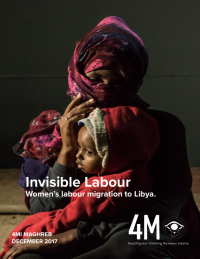The NewArab | 10.04.2018
Stories of women struggling across sea borders are rarely heard
Marta Bellingreri
Destinity wanted to cross the Italian-French border in the Alps in hopes of safely reaching France to seek asylum and better care. She was pregnant and sick.
The French police found Destinity and her husband at the crossing, but they were pushed back and left in Bardonecchia, an Italian town in the city of Turin, well-known for skiing tourists. Heavily pregnant Destinity was abandoned in a snowy town near the Alps border during one of the coldest winters in Europe. She then spent a month at a hospital close to Turin where she gave birth to a baby weighing less than two pounds. The day after, Destinity died.
March 22, 2018 marked yet another tragic day for the European border regime. Destinity’s story may be one of the latest, but it definitely is not the first of its kind. An insightful report, written by the members of the international collective Watch the Med Alarm Phone (WTM-AP), highlighted voices and stories of women from different nationalities and continents who have struggled across sea and borders.

